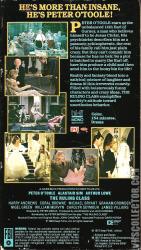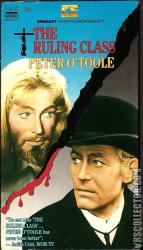The Ruling Class
Catalog Number
2085
-
Primary Distributor (If not listed, select "OTHER")
Catalog Number
2085
Primary Distributor (If not listed, select "OTHER")
Release Year
Country
N/A (NTSC)
N/A | N/A | N/A
N/A | N/A
The Ruling Class (1972)
Additional Information
Additional Information
Peter O'Toole is twice as funny and twice as crazy as ever before.
The Second Coming of Peter O'Toole.
An institutionalized schizophrenic with a Messiah complex inherits the position of an English Earl in this cutting satire of British society, based on a play by Peter Barnes. The film's irreverent tone is established with the disturbingly hilarious death of the thirteenth Earl of Gurney during a bizarre attempt at auto-erotic asphyxiation. To the dismay of the earl's family, the title passes to his son Jack (Peter O'Toole), who has been locked away for eight years after claiming to be the second coming of Jesus Christ. Mad but harmless, Jack is released to assume his seat. However, his embrace of Christianity proves incompatible with a position of power in "normal" society, where peace and love are considered serious weaknesses, and a somewhat unhinged psychiatrist is called to help him adjust. Meanwhile, Jack's scheming uncle, Sir Charles (William Mervyn), works on developing a complex scheme to trick Jack out of his position. Loaded with idiosyncratic touches from eccentric camera angles to unexpected outbursts of song, the film creates an experience nearly as inspired and mad as O'Toole's brilliantly hilarious central performance. The film's devilish invention may at times seem overloaded, but most drawbacks are redeemed by the sharpness of the satire, particularly during the memorably disturbing finale.
The Ruling Class is a 1972 British black comedy film.[1] It is an adaptation of Peter Barnes' satirical stage play which tells the story of a paranoid schizophrenic British nobleman (played by Peter O'Toole) who inherits a peerage. The film co-stars Alastair Sim, William Mervyn, Coral Browne, Harry Andrews, Carolyn Seymour, James Villiers and Arthur Lowe. It was produced by Jules Buck and directed by Peter Medak.
The film is a "commercial failure [...that] has since become a cult classic";[2] Peter O'Toole described it as "a comedy with tragic relief"
The film divided critics. The New York Times described it as "fantastic fun" and Variety called it "brilliantly caustic", but the Los Angeles Times called it "snail-slow, shrill and gesticulating" and Newsweek said it was a "sledgehammer satire". Jay Cocks called the screenplay a "snarling, overwrought and somewhat parochial satire on aristocracy and privileged morality"; he called the film "wretchedly photographed...as if it were shot under floodlights"; in contrast Cocks praised the performances by Alastair Sim, Arthur Lowe, William Mervyn, Coral Browne, and James Villiers, but reserves most of his praise for O'Toole, saying his performance is of "such intensity that it may trouble sleep as surely as it will haunt memory. All actors can play insanity; few play it well. O'Toole begins where other actors stop, with the unfocused gaze, the abrupt bursts of frenzied high spirits and precipitous depressions. Funny, disturbing, finally devastating, O'Toole finds his way into the workings of madness, revealing the anger and consuming anguish at the source."[4]
Despite mixed critical reaction to the film, O'Toole's performance was universally praised and garnered numerous prestigious awards and prizes, including an Academy Award nomination for Best Actor. Reportedly, when United Artists, its North American distributor, told producer Jules Buck that it would be cutting the film extensively for US release, Buck punched the company's London representative and bought the film back.[citation needed] Avco Embassy then bought distribution rights and cut its 154-minute running time by six minutes.[3]
In a review nearly 30 years after The Ruling Class was first released, Ian Christie said the film is "unashamedly theatrical, and it emerges from a particularly interesting period in English culture when theatre and cinema together were mining a rich vein of flamboyant self-analysis. Many stage works of this period cry out for filmic extension—in fact, Medak had just filmed a very different play that mingled fantasy and reality by a writer often bracketed with Barnes, Peter Nichols’ A Day in the Death of Joe Egg. But what makes The Ruling Class exceptional (and difficult for some) are its outrageous mixing of genres and its sheer ambition. Not only are there allusions to Shakespeare and Marlowe, but also to Wilde and Whitehall farce; to the gentility of Ealing Studios, with a plot that distantly evokes that other great black comedy Kind Hearts and Coronets, and to Hammer’s gore-fests
release Date: September 13, 1972
Distrib: Avco Embassy
The Second Coming of Peter O'Toole.
An institutionalized schizophrenic with a Messiah complex inherits the position of an English Earl in this cutting satire of British society, based on a play by Peter Barnes. The film's irreverent tone is established with the disturbingly hilarious death of the thirteenth Earl of Gurney during a bizarre attempt at auto-erotic asphyxiation. To the dismay of the earl's family, the title passes to his son Jack (Peter O'Toole), who has been locked away for eight years after claiming to be the second coming of Jesus Christ. Mad but harmless, Jack is released to assume his seat. However, his embrace of Christianity proves incompatible with a position of power in "normal" society, where peace and love are considered serious weaknesses, and a somewhat unhinged psychiatrist is called to help him adjust. Meanwhile, Jack's scheming uncle, Sir Charles (William Mervyn), works on developing a complex scheme to trick Jack out of his position. Loaded with idiosyncratic touches from eccentric camera angles to unexpected outbursts of song, the film creates an experience nearly as inspired and mad as O'Toole's brilliantly hilarious central performance. The film's devilish invention may at times seem overloaded, but most drawbacks are redeemed by the sharpness of the satire, particularly during the memorably disturbing finale.
The Ruling Class is a 1972 British black comedy film.[1] It is an adaptation of Peter Barnes' satirical stage play which tells the story of a paranoid schizophrenic British nobleman (played by Peter O'Toole) who inherits a peerage. The film co-stars Alastair Sim, William Mervyn, Coral Browne, Harry Andrews, Carolyn Seymour, James Villiers and Arthur Lowe. It was produced by Jules Buck and directed by Peter Medak.
The film is a "commercial failure [...that] has since become a cult classic";[2] Peter O'Toole described it as "a comedy with tragic relief"
The film divided critics. The New York Times described it as "fantastic fun" and Variety called it "brilliantly caustic", but the Los Angeles Times called it "snail-slow, shrill and gesticulating" and Newsweek said it was a "sledgehammer satire". Jay Cocks called the screenplay a "snarling, overwrought and somewhat parochial satire on aristocracy and privileged morality"; he called the film "wretchedly photographed...as if it were shot under floodlights"; in contrast Cocks praised the performances by Alastair Sim, Arthur Lowe, William Mervyn, Coral Browne, and James Villiers, but reserves most of his praise for O'Toole, saying his performance is of "such intensity that it may trouble sleep as surely as it will haunt memory. All actors can play insanity; few play it well. O'Toole begins where other actors stop, with the unfocused gaze, the abrupt bursts of frenzied high spirits and precipitous depressions. Funny, disturbing, finally devastating, O'Toole finds his way into the workings of madness, revealing the anger and consuming anguish at the source."[4]
Despite mixed critical reaction to the film, O'Toole's performance was universally praised and garnered numerous prestigious awards and prizes, including an Academy Award nomination for Best Actor. Reportedly, when United Artists, its North American distributor, told producer Jules Buck that it would be cutting the film extensively for US release, Buck punched the company's London representative and bought the film back.[citation needed] Avco Embassy then bought distribution rights and cut its 154-minute running time by six minutes.[3]
In a review nearly 30 years after The Ruling Class was first released, Ian Christie said the film is "unashamedly theatrical, and it emerges from a particularly interesting period in English culture when theatre and cinema together were mining a rich vein of flamboyant self-analysis. Many stage works of this period cry out for filmic extension—in fact, Medak had just filmed a very different play that mingled fantasy and reality by a writer often bracketed with Barnes, Peter Nichols’ A Day in the Death of Joe Egg. But what makes The Ruling Class exceptional (and difficult for some) are its outrageous mixing of genres and its sheer ambition. Not only are there allusions to Shakespeare and Marlowe, but also to Wilde and Whitehall farce; to the gentility of Ealing Studios, with a plot that distantly evokes that other great black comedy Kind Hearts and Coronets, and to Hammer’s gore-fests
release Date: September 13, 1972
Distrib: Avco Embassy
Related Releases1
Catalog Number
WBF 8080
Primary Distributor (If not listed, select "OTHER")
The Ruling Class (1972)
Release Year
Catalog Number
WBF 8080
Primary Distributor (If not listed, select "OTHER")
Catalog Number
WBF 8080










Comments0
Login / Register to post comments